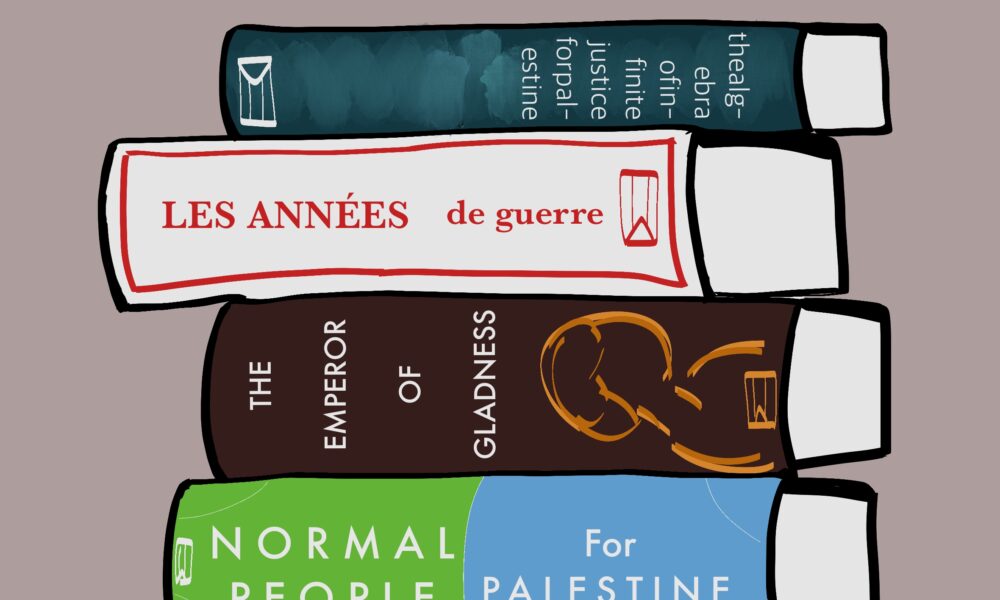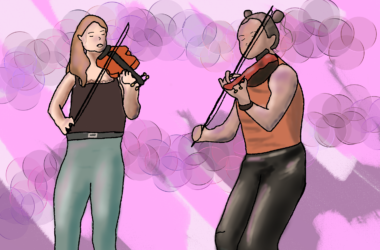Content Warning: Mentions of genocide
Reading is a political act. Whether it be the choice of what books a predominantly white industry chooses to publish, what books one has access to, or even the privilege of having time to read, literature is not neutral—especially in our current combative political climate.
In the wake of Donald Trump’s recent re-election, readers and experts alike have voiced concerns over possible future book bans. Project 2025, the manifesto in which Trump and his allies are now clearly expressing intent to execute over the United States upon his inauguration, recommends implementing book bans in order to protect children from reading pornography. However, this is a dog whistle meant to conceal that, in effect, books with 2SLGBTQIA+ themes will be the first to go as their content is flattened by conservatives as “pornography.” This plan follows the disturbing trend of libraries and schools banning texts that deal with racism, homophobia, and sexism due to right-wing pressure which has also reached Canada.
In another case of politicization in the literary world, PalFest and other campaign groups put forth a cultural boycott of Israeli literary institutions signed by thousands of authors and literary workers in response to the Israeli genocide of Palestinians in Gaza. The boycott follows the Boycott, Divestment, and Sanctions (BDS) movement guidelines that call for the rejection of the normalization of Israeli culture to justify the occupation of Palestinians. This movement follows in the footsteps of similar boycotts of South African goods to oppose the country’s apartheid state in the 1980s.
Specifically, this cultural boycott is targeting Israeli literary institutions that are either silent about or complicit in Palestinian oppression. The boycott’s supporters include prominent and prizewinning contemporary authors such as Percival Everett, Viet Thanh Nguyen, Annie Ernaux, Rachel Kushner, Ocean Vuong, and Sally Rooney, the Irish author who has been deemed the ‘voice of a generation’ after the boom of her novel Normal People. She has been outspoken in her support for Palestinian rights for years. This ranges from refusing to sell Hebrew translation rights to an Israeli publisher in 2021 to expressing her solidarity with the people of Palestine in a speech at the recent launch of her latest novel. Rupi Kaur also showed her support of the boycott by refusing an invitation from the White House for a Diwali event last fall on account of the Biden administration’s continued armament of the Israeli military.
Discussions of the Israeli occupation of Palestine have never been without controversy, especially for Palestinian authors. A few days after the Oct. 7 attack, Adania Shibli, the Palestinian author of Minor Detail, which focuses on a girl murdered by IDF soldiers in 1949, had her award ceremony for the book cancelled by The Frankfurt Book Fair in Germany. This decision provoked outrage from fellow writers and activists as it seemed to be made solely based on her Palestinian origins; Shibli had never condoned Hamas’ actions or expressed any disrespect to the victims of Oct. 7. The Fair responded by declaring their continued support for Israel, which is part of a larger conversation about German institutions’ complicity in Israeli war crimes.
As for the recent literary boycott, over a thousand industry workers signed an open letter that denounced its intention. The letter pushes against the message that book spaces should not be political, arguing that this reduces the transformative power that books and their authors have to create tangible change and stating that boycotts create more divisiveness.
However, as readers and authors respond to the complex and often controversial calls for political action in the literary world, books remain a powerful tool to create change in the world we want to inhabit. The choice to depoliticize literature is a privilege that only a few have when books have the power to bring awareness and tangibly impact movements. By continuing the boycott, there is a clear message that we must fight against injustice by ensuring that our literature does not stay neutral.









